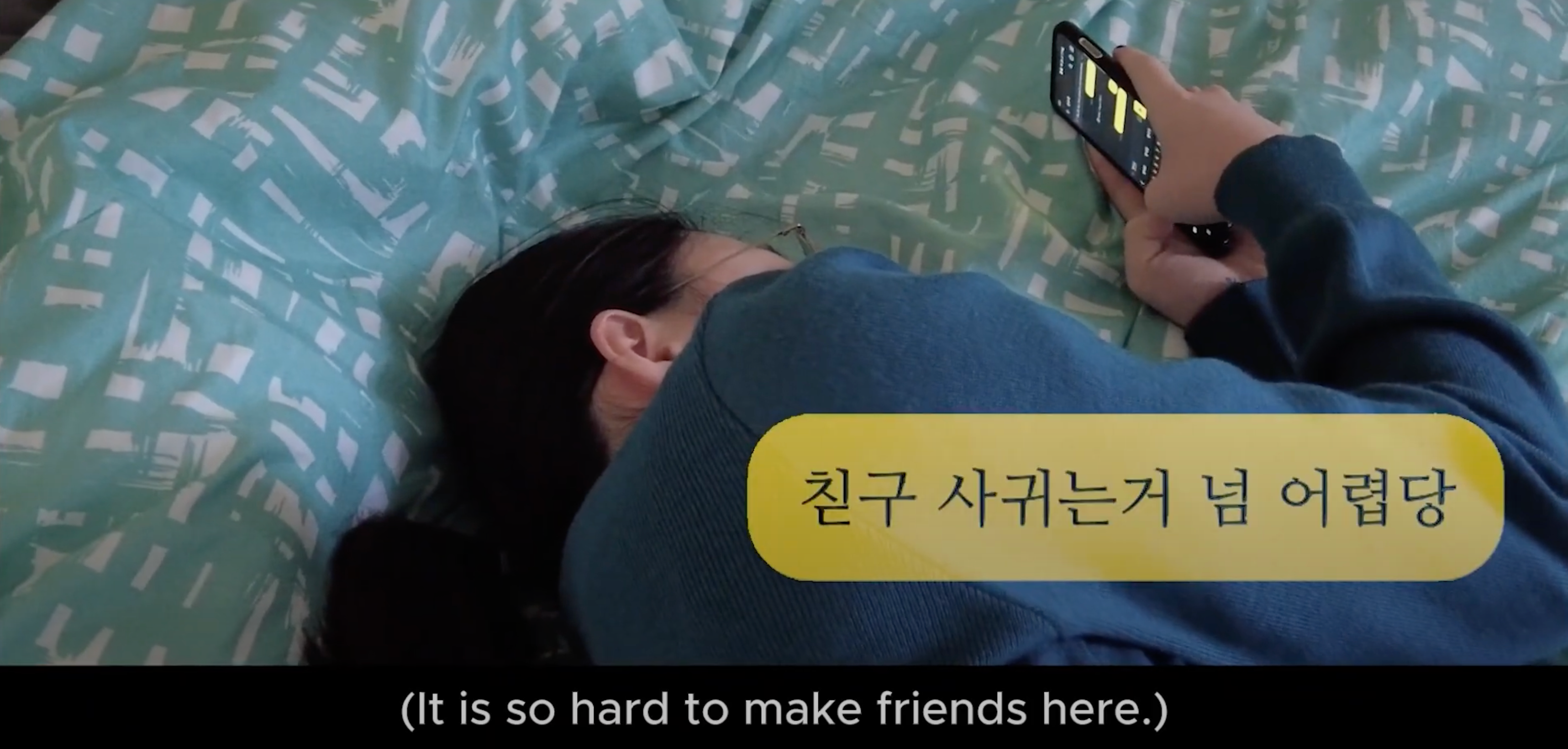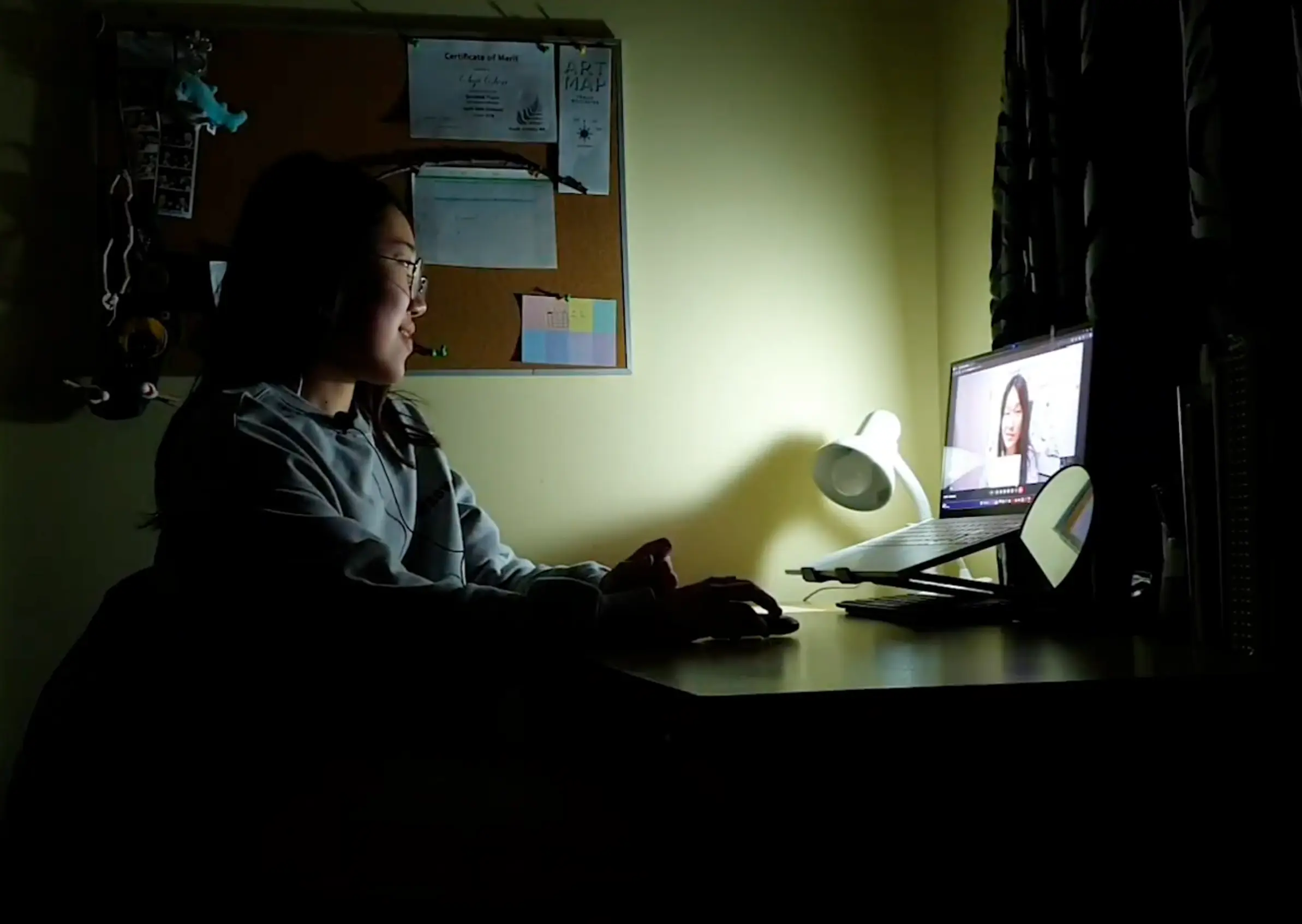REVIEW: The Unsent Letter
Written by Hyejun (Haley) Lee.
The short documentary film The Unsent Letter portrays the autobiographical story and emotions of Suji Son, who serves as both the director and actor of the film. One of the reasons this film resonates deeply with audiences is its profoundly realistic storyline—one that many people, especially international students, can easily relate to.
Like the protagonist in the film, many Korean students choose to study abroad due to the relentlessly competitive education system and the ever-growing academic pressure in Korea. However, contrary to the expectation that studying in a foreign country will be easier, students often encounter difficulties sooner than anticipated. One of the biggest initial challenges is the language barrier. Many students and parents in Korea tend to underestimate the difficulty of adapting to a new linguistic environment, largely because of the early exposure to American English. However, countries like New Zealand—though English-speaking—have their own distinct accents, colloquialisms, and cultural expressions that differ significantly from American English. Students unfamiliar with these nuances often feel confused and overwhelmed from the start.
"...contrary to the expectation that studying in a foreign country will be easier, students often encounter difficulties sooner than anticipated."
I could personally relate to this aspect of Suji’s story. As an international student myself, I was reminded of my early days in New Zealand while watching her struggle to connect with those around her. The language barrier is not just about understanding words—it is a wall that often blocks the building of meaningful relationships. Even when trying to engage with local students, I found their slang, jokes, and cultural references confusing and unfamiliar. Moreover, New Zealand's integration of Māori culture into daily life presented another layer of unfamiliarity. From signage and place names to public ceremonies, Māori language and traditions are deeply embedded in society—something completely new and foreign to me. Being surrounded by a culture and language I couldn’t fully grasp often made me question whether I truly belonged. The feelings of alienation and identity confusion that Suji expresses in the film deeply mirrored my own. In that sense, her story felt like my story too.
"The feelings of alienation and identity confusion that Suji expresses in the film deeply mirrored my own. In that sense, her story felt like my story too."
The documentary also struck an emotional chord with me when Suji breaks down in tears over the guilt she feels toward her parents. This is a sentiment many international students understand all too well. We often pay several times more in tuition than local students, with our families making enormous sacrifices—both financial and emotional—for our future. Though my parents always reassured me that their support was an investment in my growth, the pressure to meet expectations weighed heavily on me. In New Zealand’s academic environment, excelling isn’t easy. At times, just meeting graduation requirements feels like an uphill battle. Whenever I failed to achieve the results I hoped for, I found myself disappointed not only in my performance but also in my inability to repay my parents’ faith in me. For a long time, I thought I was alone in carrying this emotional burden. But watching Suji’s story made me realize that many international students silently share this weight. That realization brought an unexpected sense of comfort and solidarity. It reminded me that the quiet pain and struggles we often hide are, in fact, widely shared.
The language barrier is not just about understanding words—it is a wall that often blocks the building of meaningful relationships.
By focusing not on glamorous success stories but on silent struggles and unspoken emotions, The Unsent Letter delivers an authenticity that deeply touches the heart. It delicately captures not only the external hardships of studying abroad but also the cultural conflicts, emotional isolation, and the complex, bittersweet bonds between parents and children. Whether you’re preparing for life abroad, currently living it, or supporting someone from afar, this film is a powerful reminder of the resilience, vulnerability, and love that shape the journey of every international student.

이 단편 다큐멘터리 영화, The Unsent Letter, 는 이 이야기의 주인공이자 감독을 맡은 손수지양의 자전적 이야기의 감정들을 보여주고 있습니다. 이 영화가 관객들, 특히 국제 학생들에게 가장 공감을 일으키는 부분 중 하나는 상당히 현실적인 이야기 때문이라고 생각합니다.
이 이야기의 주인공처럼, 많은 한국 학생들은 치열한 입시경쟁과 점점 더 과열 되어가는 학업적 압박을 견디지 못하고 해외 유학을 결심하게 됩니다. 하지만, 외국에서의 공부가 한국보다는 쉬울 것 같다는 처음의 기대와는 달리, 그들은 곧 큰 어려움을 겪게 됩니다. 바로, 가장 크고 처음 맞는 문제 중 하나인 ‘언어의 장벽’ 입니다. 한국의 미성년의 아이들과 부모들은 어린 시절부터 배워온 미국식 영어에 큰 자신감을 가지며 새로운 언어 환경에서의 적응도 쉬울것이라고 과소평가하는 경우가 많습니다. 하지만, 뉴질랜드처럼 같은 영어권 나라임에도 불구하고, 각 나라마다 고유의 악센트, 발음, 그리고 문화적 표현법이 미국, 그리고 미국식 영어와 크게 다른 경우가 존재합니다. 학생들은 익숙하지 않고 생각치도 못했던 다름에 시작부터 혼란을 느끼고 당황스러워 하게 됩니다.
저는 수지의 이야기에 개인적으로 깊이 공감할 수 있었습니다. 저 역시 국제학생으로서, 그녀가 주변 사람들과 소통하려 애쓰는 모습을 보며 뉴질랜드에서의 유학생활 초기가 떠올랐습니다. 언어 장벽은 단순히 단어를 이해하는 문제를 넘어, 의미 있는 관계를 형성하는 데 있어 커다란 벽이 되기도 합니다. 현지 학생들과 대화를 시도할 때조차, 그들의 속어, 농담, 문화적 참조들은 낯설고 이해하기 어려웠습니다. 게다가 뉴질랜드는 일상 속에 마오리 문화를 깊이 통합하고 있어, 또 다른 생소함을 마주하게 했습니다. 도로 표지판과 지명, 공공 행사 등에서 마오리 언어와 전통은 일상적으로 사용되며, 저에게는 완전히 새로운 세계였습니다. 이처럼 완전히 이해할 수 없는 문화와 언어에 둘러싸여 있다 보면, ‘내가 이곳에 속할 수 있는 사람인가’ 하는 자아 정체성에 대한 의문이 들곤 했습니다. 수지가 영화에서 표현한 소외감과 정체성 혼란은 제 감정과 완벽히 맞닿아 있었습니다. 그런 점에서, 그녀의 이야기는 곧 저의 이야기이기도 했습니다.
또한 다큐멘터리에서 수지가 부모님에 대한 죄책감으로 눈물을 터뜨리는 장면은 저에게도 깊은 감정의 울림을 주었습니다. 이는 많은 국제학생들이 너무도 잘 아는 감정일 것입니다. 우리는 종종 현지 학생들보다 몇 배나 비싼 등록금을 내며, 가족들은 우리의 미래를 위해 막대한 재정적·감정적 희생을 감수합니다. 저희 부모님은 언제나 저에 대한 지원이 제 성장을 위한 투자라고 말해주셨지만, 그 기대에 부응해야 한다는 압박감은 늘 무겁게 느껴졌습니다. 뉴질랜드의 학문적 환경은 결코 만만하지 않으며, 때로는 졸업 요건을 충족하는 것조차 버거운 산처럼 느껴지곤 합니다. 원하는 성과를 얻지 못했을 때마다, 저는 제 성적에 대한 실망뿐 아니라 부모님의 믿음에 보답하지 못했다는 자책감에 시달렸습니다. 오랫동안 저는 이런 감정적 부담을 혼자만 짊어지고 있다고 생각했습니다. 하지만 수지의 이야기를 보면서, 많은 국제학생들이 조용히 이 무게를 함께 견디고 있다는 사실을 깨달았습니다. 그 깨달음은 뜻밖의 위로와 연대감을 안겨주었습니다. 우리가 말없이 감추고 살아가는 아픔과 고통이 사실은 많은 사람들과 공유되는 것이란 점을 떠올리게 해주었기 때문입니다.
The Unsent Letter는 화려한 성공담이 아닌, 조용한 고통과 말로 표현되지 않은 감정에 집중함으로써 깊은 울림을 전해주는 진정성 있는 작품입니다. 이 다큐멘터리는 유학 생활에서 마주하는 외적인 어려움뿐만 아니라, 문화적 충돌, 감정적인 고립, 그리고 부모와 자식 간의 복잡하고도 씁쓸한 사랑의 감정을 섬세하게 포착해냅니다. 해외 생활을 준비 중인 사람, 그 속에 있는 사람, 혹은 멀리서 누군가를 응원하는 사람 모두에게 이 작품은 국제학생의 여정을 이루는 회복력, 취약함, 그리고 사랑에 대해 깊이 있게 되새기게 하는 강력한 메시지를 전해줍니다.
About Hyejun (Haley) Lee:
Haley Lee is a screen director who is from Auckland University of Technology. She has led the production of various short films with fresh stories and unique concepts. Her strength lies in using engaging storytelling to captivate audiences.
